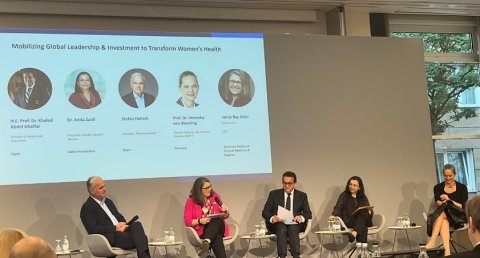A spotlight on women’s health: Attending the Women’s Health Innovation Equity Forum

Tamar Ghosh, RSTMH’s Chief Executive, was lucky enough to join more than 150 global leaders, innovators and funders at the Women’s Health Innovation Equity Forum in Berlin, in the run up to the World Health Summit.
This two-day meeting, co-hosted by The Gates Foundation and the German Health Alliance on 11 – 12 October, focused on ways to advance accountability and progress in women’s health research and development (R&D) and build on the momentum of the Women’s Health Innovation Opportunity Map.
The network that gathered for this event was international, with participants across Africa, Asia, Europe and the US, made up of clinicians, programme implementers, funders, researchers, industry representatives and senior government delegates from Germany and beyond.
The key focus of the event was to build on the Women’s Health Innovation Opportunity Map, an initiative launched in 2023 by the Innovation Equity forum, sponsored by the Bill & Melinda Gates Foundation and US National Institutes of Health. The map identifies 50 opportunities that are critical for catalysing innovation to improve the health of women, from research design and methodologies, to ensuring that women’s needs and voices guide national and global health agendas.
What is women’s health?
Women's health is a comprehensive area of healthcare that looks at issues affecting women and can include female specific health conditions as well as conditions that disproportionately affect women.
It incorporates health issues that affect people across their lifecycle and affect both their mental and physical health, including maternal, reproductive and menstrual health, ovarian and breast cancers, diseases such as endometriosis, and diseases that impact women in unique ways such as cardiometabolic diseases, osteoporosis, and dementia.
“Women’s health is not a side issue. It is the cornerstone of humanity’s progress, prosperity, and future,” said Kriti Sanon, United Nations Population Fund (UNFPA) India Honorary Ambassador for Gender Equality, Actor, Producer & Entrepreneur in the closing speech of the World Health Summit.
Despite making up half of the world’s population, women are underrepresented in global research and innovation, with just 1% of healthcare research and development invested in female-specific conditions aside from oncology. And while women outlive men, they spend 25% more time in poor health, facing conditions that affect them disproportionately or uniquely.
This forum highlighted the importance of innovation in this area to implement real progress, as well as substantial and specific funding. Earlier this year, The Gates Foundation announced a $2.5 billion commitment to accelerate research and development exclusively to advance women’s health.
Some recent successes in the field of women’s health were brought to the forefront of the discussion, such as the uptake of the HPV vaccine.
As of February 2025, 148 member states of the World Health Organisation (WHO) have incorporated the HPV vaccine into their national immunisation programs. The weighted average global uptake in 2023 was 47.6% for the full series of vaccines among adolescent girls aged 9-14. So, while there have been significant milestones that have been celebrated in recent years, global HPV vaccination coverage remains considerably below the global target of 90%, demonstrating the enormous progress yet to be made through advocacy, access and ongoing research.
Keeping up momentum
As part of the ongoing commitment to changing the outcomes for women’s health, a new partnership was announced between the US National Academy of Medicine and Kenya Medical Research Institute (KEMRI).
The Leadership for Innovation and Excellence in Accelerating Research on Women’s Health (LEA-WH) Program is set to launch in January 2026. The three-year project will strengthen Africa’s research leadership in women’s health by equipping and mentoring a new generation of African scientists, researchers, and innovators to develop original, locally driven solutions to health challenges that disproportionately impact women.
From our perspective, RSTMH continues to make women’s health a priority and keep it at the top of the global health agenda. Of our grants awarded between 2019 and 2024, we funded over 100 studies in women’s health topics around the world.
To close the forum, a high-level panel discussion highlighted what we need to keep up the momentum and drive real change in this area. Importantly, it was highlighted that there was not only a need to gather and generate data, but also to coordinate, share and distribute data once we have it.